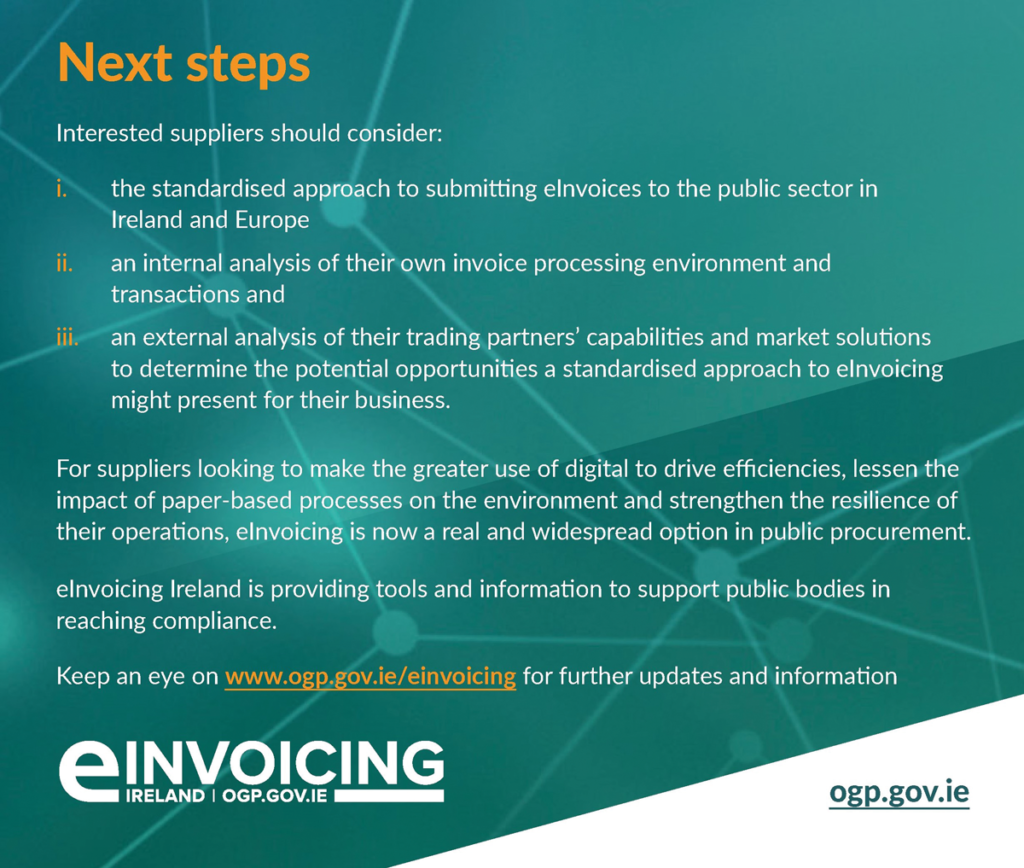eInvoicing: Taxing times across Europe

eInvoicing is proving popular across Europe. Last year alone saw Belgium, France, Italy, Poland and Hungary move towards extending or introducing mandatory electronic Invoicing (eInvoicing) in their societies. Oonagh Hackett, eInvoicing Ireland Programme Manager in the Office of Government Procurement (OGP), outlines a number of new policies and initiatives across Europe that shine a light on opportunities made possible when eInvoicing is the norm.
It is gradually becoming more important for Irish suppliers to be able to issue invoices in a structured electronic format in order to compete for cross border trade in the EU. There is also a growing trend by public administrations across Europe to further leverage eInvoicing to simplify tax reporting and compliance, reduce administrative costs for businesses and enable real-time management of aspects of both government and business finances.
How public bodies enabled eInvoicing
Electronic invoicing is changing the face of how we do business, and today public administrations across the EU are reaping the benefits of this digital milestone.
From day one, the OGP provided vital supports and advice around eInvoicing and it continues to play a crucial role in the entire process.
Since April 2020 when the European Union made it a legal requirement for all public bodies to be able to process electronic invoices, the OGP has been there every step of the way.
Firstly, the OGP set up an eInvoicing Ireland Programme to help public bodies transition to eInvoicing and meet their legal obligations.
Hackett explains: “A national approach was established for public bodies in Ireland to support the receipt of EU standard eInvoices through the Peppol network.
“To receive and process eInvoices, public bodies must avail of a service to connect to the Peppol network, and likewise, suppliers who wish to send eInvoices must avail of a similar connection service.
“So, the OGP established a National Framework Agreement to provide eInvoicing and Peppol networking services to the public sector in Ireland.”
The eInvoicing service providers on the Framework connect public bodies to the Peppol network and offer solutions to enable compliance with the EU Directive around eInvoicing.
Hackett adds: “To date, our clients from across all sectors of the public service have found the framework easy to use to access the eInvoicing solutions and can now process EU standard eInvoices from suppliers.
“Getting suppliers on board is not as easy as they are not obliged to send eInvoices. Generally, where eInvoicing has been made mandatory for suppliers, like, for example, in Italy or Norway, the take up is very high.”
Reaping the benefits
Therefore, the focus now must move to suppliers and how to entice more of them to sign up to eInvoicing. From a business perspective, the more people using eInvoicing, the better as there are so many benefits to this digital process.
One of the most obvious and timely advantages to eInvoicing is the environmental impact. As the climate crisis intensifies, using less paper and reducing the associated energy and costs for transport and storage is always welcome.
As there is a standardised approach to eInvoicing across Ireland and Europe, it makes it easier for suppliers to do business with government agencies. Once suppliers are up and running with an eInvoicing system, they can also use it for other transactions.
Mandatory
Some member states have made eInvoicing mandatory for suppliers, others have introduced electronic ordering and payments, while others have even established mandatory eInvoicing for business to business (B2B).
France has been ahead of the curve on eInvoicing. Since January 2020, all suppliers to the public sector were required to issue eInvoices. This year, France announced plans for B2B eInvoicing. The gradual mandate will start with large enterprises in 2024, extending to SMEs in 2026.
In Belgium, the Walloon regional Government say that eInvoicing will be the preferred option from next year. From January 2022, they will no longer accept invoices via email in PDF or word format. eInvoicing is already mandatory in other areas of Belgium.
In Poland, eInvoicing will also be the only option from January 2023, replacing the current paper and email invoices.
Hackett says: “Over the last year, we are seeing a trend as governments look to push the boundaries further and harness the potential of eInvoicing for tax reporting, compliance and real-time management of finance.
“In Italy, for example, both public and private sector invoices are processed through a centralised system known as the Sistema di Interscambio (SDI) which is controlled by the tax authority.
“Mandatory eInvoicing allows the tax authority to simplify tax compliance for businesses via the automatic capture of data in real-time from invoices. Italy estimates, around €2 billion could be directly attributed to the improvement in VAT compliance following the introduction of the measure.”
Hackett continues: “Furthermore, in the context of the Covid-19 pandemic, in a recent submission to the European Commission, the Italian Government noted how data from mandatory eInvoicing proved to be of great help in analysing the changes in the economy associated with the health crisis, and in putting into place the most appropriate support measures.”

Leveraging eInvoicing data to help make tax administrations more effective for the greater good of economy and society is also an objective for other European countries such as France and Hungary.
It’s clear to see the wide-reaching benefits of eInvoicing, and the eInvoicing Ireland team along with partners in Central Government, Health, Education and Local Government will continue to raise awareness about the intrinsic value of this digital process for both suppliers and buyers.
The National Standard Authority of Ireland (NSAI) also plays a part in promoting the use of eInvoicing and is producing guidance for suppliers to support them in making this digital switch.
Several other initiatives are underway across the public service to enable suppliers get on board with eInvoicing, and crucially, to then reap the benefits for the future.
Office of Government Procurement eInvoicing supports for Public Bodies
To facilitate public bodies in reaching compliance with the eInvoicing Directive, the Office of Government Procurement established a National Framework Agreement for the provision of eInvoicing and Peppol networking services to the public sector in Ireland.
The eInvoicing service providers on the Framework connect public bodies to the Peppol network and offer solutions and services to enable basic compliance with the Directive as well as a more fully integrated approach to eInvoicing, facilitating ‘straight-through processing’. eInvoicing and straight-through processing helps businesses pay and receive money faster and more efficiently.
|
For further information: Please log onto www.gov.ie/en/publication/d2be0-einvoicing-ireland/ Accessing the Framework: For anyone looking to access the OGP eInvoicing Framework, please log onto the OGP Buyer Zone via www.buyerzone.gov.ie/ and select/ search as follows:
OGP Clients must register to gain access to the Buyer zone available to all public service buyers accessing live contracts/frameworks. |
T: +353 1 773 8310
E: oonagh.hackett@ogp.gov.ie / einvoicing@ogp.gov.ie
W: https://www.gov.ie/en/organisation/office-of-government-procurement






